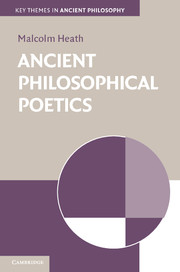Chapter Two - A radical solution
Plato’s Republic
Published online by Cambridge University Press: 05 December 2012
Summary
According to early Greek poets, poetry bewitches us (§1.1). The state of mind it puts us into inhibits us from thinking critically about what it is saying. It may shape our thoughts, imaginations and actions at a level too deep for us to be aware of or control. That psychological power was still felt in the fifth and fourth centuries. Gorgias speaks of poetry’s overpowering emotional impact: ‘its hearers shudder with terror, shed tears of pity, and yearn with sad longing; the soul, affected by the words, feels as its own an emotion aroused by the good and bad fortunes of other people’s actions and lives’ (B11.9). In Plato’s Ion a rhapsode describes how the recital of dramatic or pathetic scenes from the Iliad and Odyssey grips the emotions of performer and audience alike (535b–e). In the Republic, Socrates acknowledges how intensely we enjoy sharing the emotions of characters in epic or tragedy (10, 605c–d). He strongly disapproves: our enjoyment of this emotional stimulus is morally dangerous. Socrates also maintains, as Xenophanes did (§1.2), that poetry’s theological falsehoods pose a threat to our moral integrity (2, 337d–383c). The critique of poetry in the Republic is the primary focus of this chapter. Sporadic reference will be made to other works, but there will be no attempt to produce a synthesis of Plato’s views on poetry. Since Plato is an implicit background or explicit source to most subsequent discussions of poetry, there will be opportunities to fill in some of the gaps in later chapters (especially, but not only, §5.1). Here we will take the opportunity to examine in some detail the philosophical critique of the poetic tradition in its most sophisticated and radical form – a complex but (I shall contend) coherent argument about poetry, developed in the context of broader issues.
- Type
- Chapter
- Information
- Ancient Philosophical Poetics , pp. 9 - 55Publisher: Cambridge University PressPrint publication year: 2012



